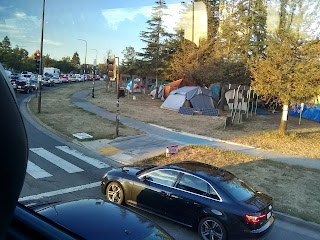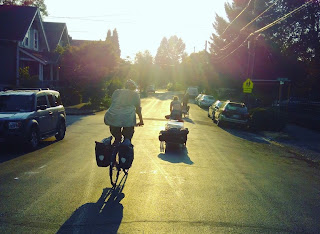First They Came For The Homeless has existed I believe for about three years. It’s a changing group of people, though some have been part of it the whole time. It began with fifteen people who were part of Occupy SF. Some are lifetime activists, some are just poor, some have jobs, we all have various physical or mental uniquenesses (like everybody does). It is a protest, and there are no drugs/alcohol allowed, so the demographics are are not representative of the homeless population overall. But our work will and does benefit the overall population.
Last winter, in what was called the “Poor Tour”, they were evicted from one location after another, 17 times, sometimes with violence, often with possessions taken or destroyed by the police.
I joined the camp when I returned from my summer in Oregon, so I’ve been there about two months now.
We are protesting:
- That it is illegal to exist in Berkeley and many cities unless you can afford rent.
- The laws and enforcement of the laws that prevent people from
- That extreme economic inequality means that in many places ~20% of housing is empty, owned by investors or the wealthy, while thousands of people live on the streets.
- Police brutality
- That although we still see some of them, much homelessness is hidden from sight, and forced evictions happen at 4am when the public are not watching.
- That millions of dollars and many hours of police time are spent on evicting homeless from one location to another, when they have nowhere they are allowed to be. These resources could be better used.
There are other benefits/purposes too:
- Creating community, both within the camp, and with the local neighbors who support us
- Demonstrating that people can get along more
- Providing stability for some people who are not cared for well by the system
- Learning how to meet some of our needs without money
We consider it successful, in that:
- FTCFTH existed as a stable intentional community at the HERE/THERE signs in Berkeley for nearly a year, providing a home for 25 people, including disabled and mentally ill who were not being cared for as well (or at all) elsewhere.
- When BART police gave us a 72 hour eviction notice two weeks ago, we filed a lawsuit, which delayed the eviction by a week, and resulted in the federal judge ordering the City of Berkeley to provide a plan by Nov 28 that would shelter substantially all of its homeless for the winter. They won’t have to adopt this plan, but still this lawsuit draws attention to the problem and might make it trickier for the city to keep evicting homeless endlessly.
- We inspire other communities to do the same thing.
With climate change, chaotic weather, wars, resource exhaustion, and growing economic inequality, there will be more and more people in the next years who cannot afford regular housing. Property law and its enforcement is unjust. It is rooted in violence. How else does one person or group claim land and prevent others from using it? May we learn to live together with kindness and understanding.
After the second court hearing last week, where the judge ruled that BART could evict us, we were given another 72hour notice. With the help of our neighbors in the community, we moved off the land by the HERE/THERE signs before the deadline, leaving it cleaner than it was before the camp moved in last year. We moved to three different locations; those who wanted a more stable location moved to Aquatic Park in west Berkeley. The protestors, myself included, moved to the lawn in front of Berkeley City Hall. A few people remained behind, occupying the strip of land between the sidewalk and street at the old location, which belongs to the city rather than to BART. BART police came and put a fence up around the entire property, as they had done on the other side of the tracks after evicting the people there the week before.
So that’s what’s up with that.
The camp at HERE/THERE as seen from the Google bus.
Neighborhood party, celebrating the delay of eviction.
Hanging out.
Cleaning up and moving out of the HERE/THERE location.
One woman refused to move out with us.
The police removed her the next day.

Fence around the BART property after the eviction. In the background you can see the tents where a few people stayed on the city property between the sidewalk and the street after the eviction.

Fence around the BART property after the eviction. In the background you can see the tents where a few people stayed on the city property between the sidewalk and the street after the eviction.
The new protest camp on the old Berkeley city hall lawn
From the steps of city hall
Other camp near the Bay
Shelling two pounds of acorns while guarding camp (haha)































